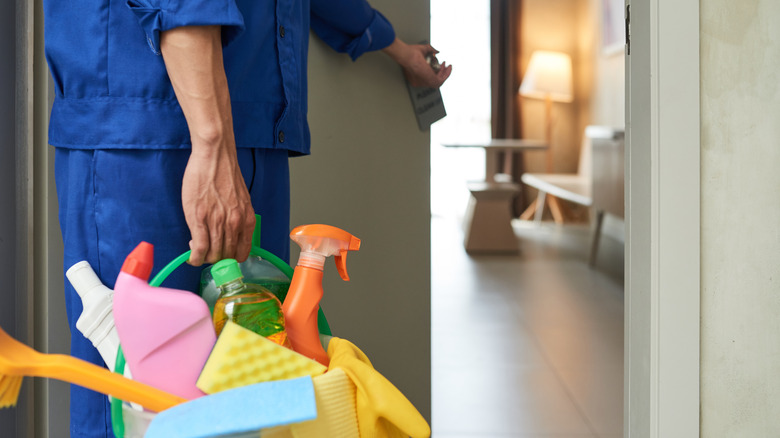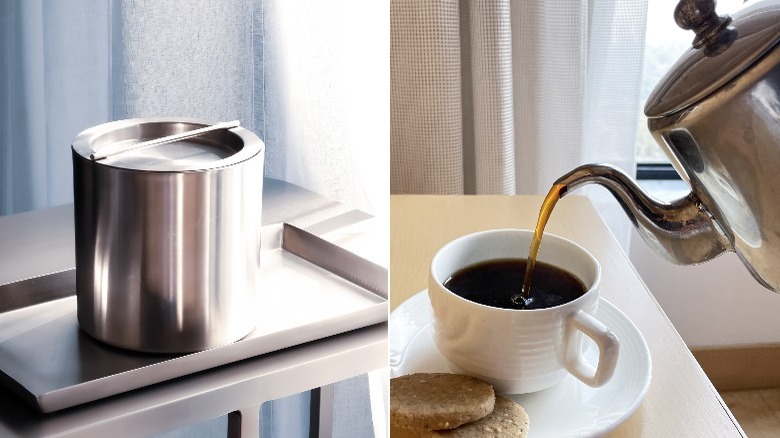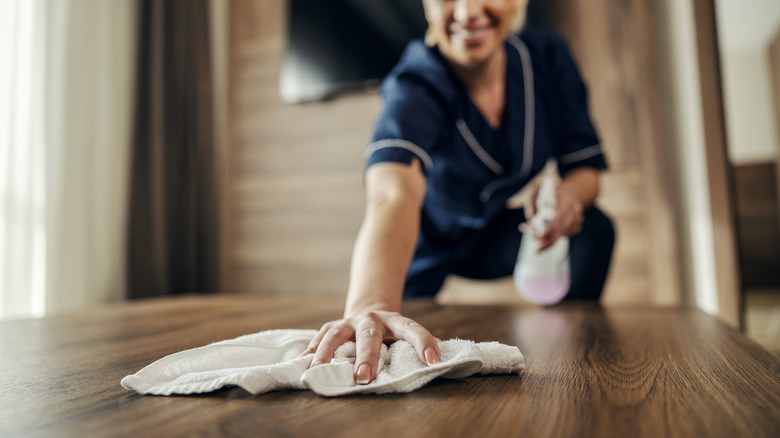The Nastiest Items In Any Hotel Room (And They're Not In The Bathroom)
Hotel rooms, especially the fancy ones, always seem so inviting. Those fluffy pillows and high-thread-count sheets make you want to dive onto the bed the moment you open the door. At first glance, these rooms look spotless, but shockingly, they're dirtier than they look. And you won't find the germiest item in the bathroom. That honor goes to one of the first objects you touch when you walk in: the light switch.
The remote control once held the crown for the nastiest part of a hotel room. However, according to an AAA inspector interviewed by The Washington Post in 2023, the light switch has since taken over. "When we first started swabbing, the remote control was the germiest, but now it is not as much," she said, noting that switches usually yield the highest number of germs during swab inspections. "It's usually the light switch at the front door that tends to fail the most for me."
Not that remote controls are off the hook. A joint 2012 study by researchers from the University of Houston, Purdue University, and the University of South Carolina found that remote controls harbor an average of 67.6 colony-forming units (CFU) of bacteria per cubic centimeter squared (via MSNBC). To put that in perspective, hospitals advise only a maximum of 5 CFU per cubic centimeter squared. Oh, and if you think those two items are the only germ-infested surfaces in your hotel room, think again.
Steer clear of the coffee pot and the ice bucket, too
Coffee pots are a staple in many hotel rooms. Unfortunately, much like you should rethink indulging in complimentary hotel breakfasts, you should exercise caution with coffee pots. According to a flight attendant who penned a food and travel diary for Bon Appétit, these pots may sometimes get used for purposes far beyond brewing coffee. "This is something most flight attendants have strong feelings about, and many senior mamas like to tell horror stories about in-room coffee pots being used to rinse pantyhose, among other things," they wrote. One user on the subreddit r/flightattendants confirmed this, writing, "And by 'Coffee makers' you really mean miniature underwear washing machines."
All of this might be hearsay, but it's better to be safe than sorry. To make matters worse, a former hotel housekeeper on the r/housekeeping subreddit admitted to doing the bare minimum when it came to cleaning them. "In an upscale joint in SoCal we only washed the coffee pots in the sink; just warm water and a tiny bit of dish soap when was available (it wasn't a priority)," they claimed.
@melly_creations Replying to @404rabbit Former hotel manager. #hotelstay #hotelcups #doesanddonts
The same goes for ice buckets. TikTok user @melly_creations (above), a former hotel manager, shared in a video that ice buckets often get utilized for purposes far grosser than storing ice. "I will not use an ice bucket at all. People use these for things you don't even want to think about. I've cleaned out puke from them," she said. Yikes!
How to dodge germs throughout your hotel stay
No matter how luxurious, expecting a hotel to be completely germ-free is a bit much. Germs lurk everywhere, after all, including in your own home. However, since hotels are public spaces, it's smart to be a bit more cautious. Go ahead and give those high-touch areas a good wipe-down for your safety and peace of mind. Besides the usual suspects like the remote, light switch, coffee pot, and ice bucket, consider cleaning door knobs, toilet flushers, and faucet handles, too. If you're not keen on walking barefoot on the carpet or lying on the bed without an extra layer of clean sheets, you can ask the hotel for freebies like an extra pair of slippers and fresh linens. And if you must use the room's non-disposable utensils, make sure to wash them properly with real dish soap.
Generally, though, germs are mostly harmless. While we're not saying you can't pick up an illness from them, it's not a given, either. "While the idea of a sink faucet being as contaminated as a toilet seat sounds unsettling, it's essential to remember that not all bacteria are harmful," Brian Campbell, a water treatment expert, told USA Today. "The risk of infection from casual contact is generally low. The bacteria on faucet handles are typically different from those inside the faucet and are often harmless. Still, it's always a good idea to practice regular hand hygiene."


